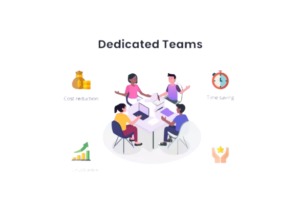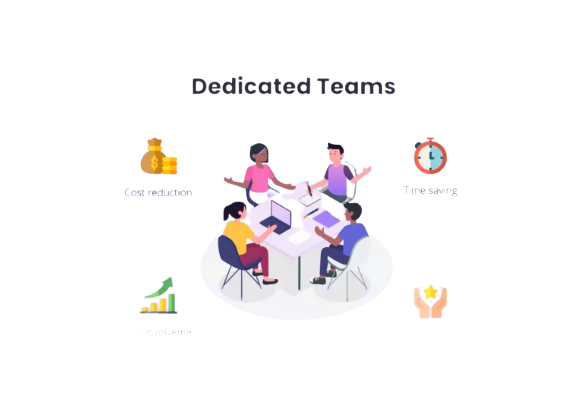Building a successful dedicated development team requires careful planning and execution. By understanding the challenges and following best practices and strategies, you can build a team that delivers high-quality results and drives the success of your organization.
Building a dedicated development team is a crucial step toward creating high-quality software. A dedicated team can bring focus and expertise to your project, ensuring the timely delivery of your software. However, building a successful dedicated development team is not an easy task. It requires a deep understanding of the project requirements, team dynamics, and development methodologies. In this blog post, we’ll discuss the best practices and challenges of building a successful dedicated development team.

The Benefits of a Dedicated Development Team
Before diving into the best practices, it’s important to understand the benefits of a dedicated development team. A dedicated team can:
- Bring in-depth knowledge of your project and business needs
- Provide focused attention to your project, ensuring timely delivery
- Foster a culture of collaboration, innovation, and excellence
- Enable better communication and alignment across team members
Best Practices for Building a Successful Dedicated Development Team
To build a successful team, you need to follow these best practices:
- Define Clear Goals and Objectives: The first step in building a dedicated team is to define clear goals and objectives for the project. You need to establish the project scope, timelines, and deliverables. This will help you identify the skills and experience required for the team.
- Identify the Right Talent: Once you’ve defined your project goals and objectives, you need to identify the right talent for your team. You can use a combination of recruitment channels, such as job postings, referrals, and recruitment agencies. It’s important to assess the candidates’ technical skills, soft skills, and cultural fit.
- Establish Clear Roles and Responsibilities: Once you’ve assembled your team, you need to establish clear roles and responsibilities for each team member. This will help avoid confusion and ensure that everyone knows their role in the project.
- Foster a Culture of Collaboration: A successful dedicated team is built on a culture of collaboration, innovation, and excellence. You need to create an environment where team members feel comfortable sharing their ideas, asking questions, and challenging assumptions. Regular team-building activities and social events can help foster this culture.
- Use Agile Methodologies: Agile methodologies, such as Scrum and Kanban, are designed for collaborative and iterative development. They enable better communication, transparency, and flexibility in the development process. Adopting an agile approach can help your team deliver high-quality software in a timely and efficient manner.
Challenges of Building a Successful Dedicated Development Team
Building a team comes with its own set of challenges. Some of the common challenges include:
- Finding the Right Talent: Identifying and hiring the right talent for your team can be a time-consuming and challenging process. You need to assess the candidates’ technical skills, soft skills, and cultural fit.
- Managing Team Dynamics: Building a dedicated team requires careful management of team dynamics. You need to ensure that team members work well together, communicate effectively, and share a common vision.
- Maintaining Consistency: A dedicated team needs to maintain consistency in its development approach, coding standards, and best practices. This can be challenging, especially when team members have different backgrounds and experiences.
- Balancing Cost and Quality: Building a dedicated team can be expensive, especially if you’re hiring top talent. You need to balance the cost of hiring with the quality of the team’s output.
Mitigating Challenges through Best Practices and Strategies
To mitigate the challenges of building a successful team, you can follow these best practices and strategies:
- Establish Clear Communication Channels: Clear communication channels, such as regular team meetings, one-on-one meetings, and status reports, can help ensure that everyone is on the same page and working towards the same goals. This can also help in avoiding misunderstandings and conflicts.
- Provide Adequate Resources: Providing your dedicated development team with the resources they need to succeed is crucial. This includes not only hardware and software but also training and professional development opportunities.
- Emphasize Teamwork and Collaboration: Developing a culture of teamwork and collaboration can help your dedicated development team work together more effectively. Encourage team members to share knowledge and work together on projects, and recognize and reward successful collaboration.
- Ensure Cultural Fit: Cultural fit is an important factor in building a successful dedicated development team. Ensure that team members share your company’s values and culture to foster a positive and productive work environment.
Conclusion
Building a successful dedicated development team requires careful planning and execution. By understanding the challenges and following best practices and strategies, you can build a team that delivers high-quality results and drives the success of your organization. Remember to focus on communication, provide adequate resources, emphasize teamwork and collaboration, and ensure cultural fit to build a team that can take your business to the next level.
BACK










